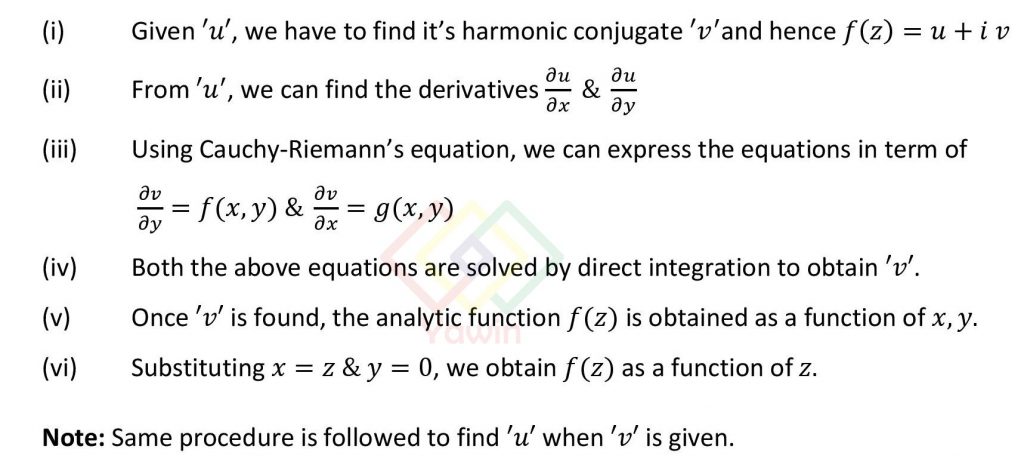Steps to find the conjugate harmonic function and the analytic function in Complex Variables

Topic
Complex Variables – Analytic Function
Type 1 – Steps to find the derivative of an analytic function in Complex Variables
Type-2 – Steps for construction of analytic function given its real or imaginary part in complex variables
Type-3 – Steps to find the conjugate harmonic function and the analytic function in Complex Variables
Type 4 – Steps for Analytic Functions not Categorized in any types in Complex Variables
Type 1 Analytic function problems
- Show that f(z)=sin z is analytic and hence find f’(z)
- Show that f (z) =cos hz is analytic and hence find f’(z)
- Show that f (z) =z^n where n is a positive integer is analytic and hence find its derivative
- Show that w=z z(bar) is not analytic function in complex variables
- Show that f (z) =e^x (cos y + i sin y) is analytic function in complex variable
- Find the derivative of the analytic function z^z
- Given that f(z)= (x^3 (1+i )-y^3 (1-i))/(x^2+y^2 ) if z≠0 and f(z) =0 if z=0, Show that f(z) satisfies Cauchy-Riemann equations at the origin
- Show that f (z)=(r+k^2/r cosθ+i (r-k^2/r) sinθ, r≠0 is a regular function of z=r e^ (iθ) Also find f'(z)
Type 2 Analytic function problems
- Construct the analytic function whose real part is u=log(sqrt((x^2+y^2))
- Find the analytic function f (z) whose imaginary part is e^x (x siny + y cosy)
- Find the analytic function f (z) given u=e^ (-x) [(x^2-y^2) cosy+2xy siny]
- Determine the analytic function f (z) =u+iv given that the real part u=e^2x (x cos(2y-y sin2y))
- Construct the analytic function whose real part is r^2 cos 2theta
Type 3 Finding the conjugate harmonic function and the analytic function
- Show that u=x^3-3xy^2+3x^2-3y^2+1 is harmonic and find its harmonic conjugate. Also find the corresponding analytic function f (z)
- Determine which of the following function is harmonic and find the conjugate harmonic function and express u+iv as an analytic function of z.(a) v=log sqrt(x+y) (b) v=cos x sinhy
- Show that u=e^x (x cosy-y siny) is harmonic and find its harmonic conjugate. Also determine the corresponding analytic function
- Given that u=x^2+4x-y^2+2y as the real part of an analytic function, find v and hence find f (z) in terms of z
- Show that u=(r+1/r) cos(theta) is harmonic. Find its harmonic conjugate and also the corresponding analytic function
Type-4: Miscellaneous Problems
- Find the analytic function f (z) =u+iv given u-v=e^x (cosy-siny)
- Find the analytic function f (z) as a function of z given that the sum of its real and imaginary parts is x^3-y^3+3xy(x-y)
- If f (z) =u+iv is analytic, find f (z) if u-v=(x-y) (x^2+4xy+y^2)
- If f (z) =u(r, θ) +iv(r, θ) is analytic and given that u+v=1/r^2 (cos(2theta-sin2theta), r≠0, determine the analytic function f (z)
- If u and v are harmonic functions show that (del u/del y-del v/del x) +i (del u/del y+ del v/del y) is analytic
- If f(z)is analytic, show that [del^2/(delx^2 )+del^2/(dely^2 )] mod(f(z))^2=4mod(f'(z))^2
- If f(z) is a regular function of z, show that {(del/delx) modf(z)}^2+ {(del/dely)modf(z)}^2= modf'(z)^2
- If f (z) is analytic show that log mod(f (z)) is harmonic
